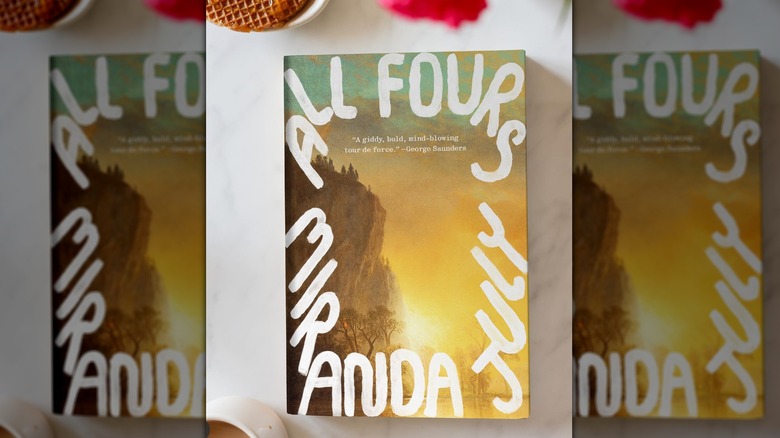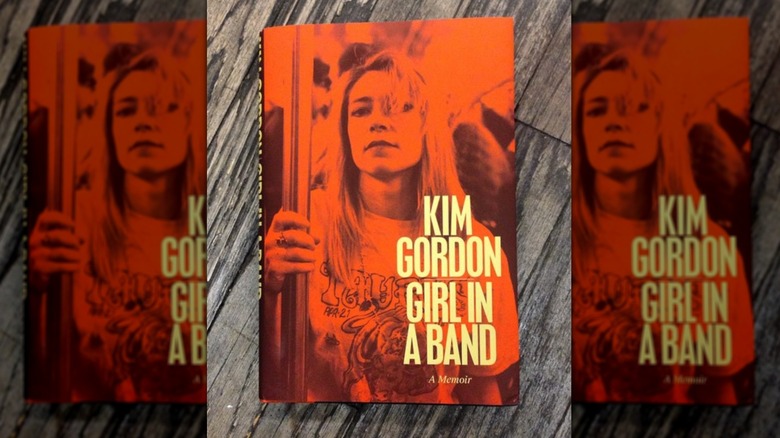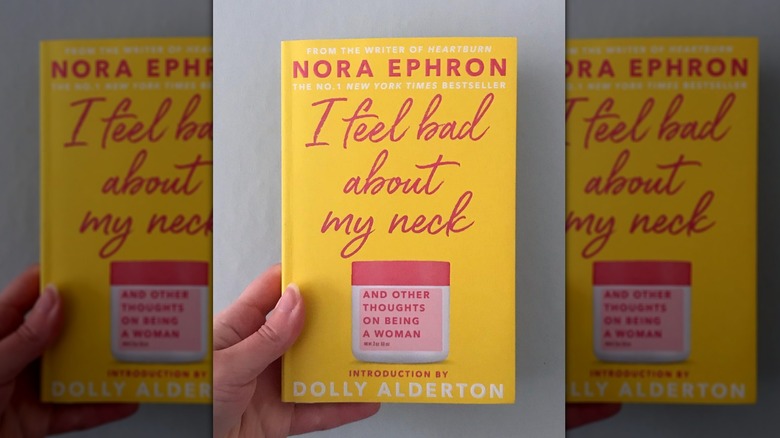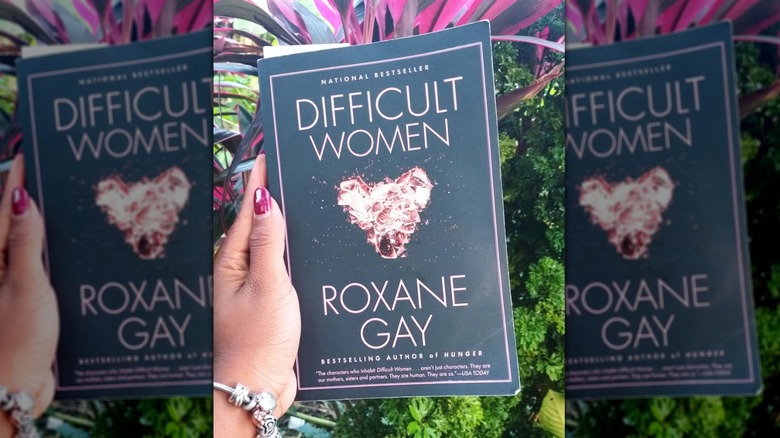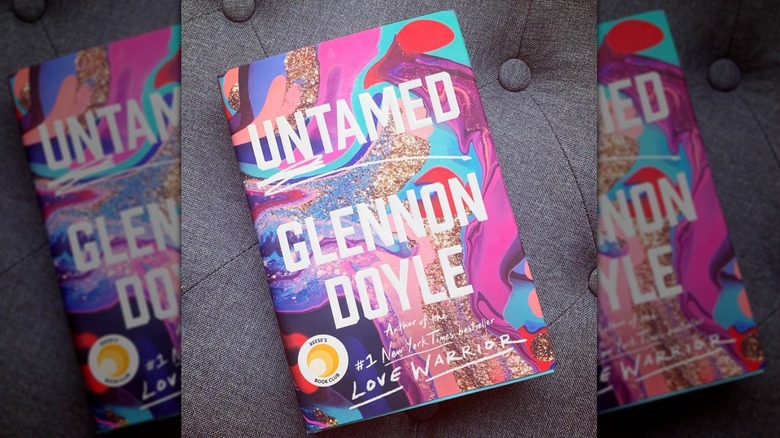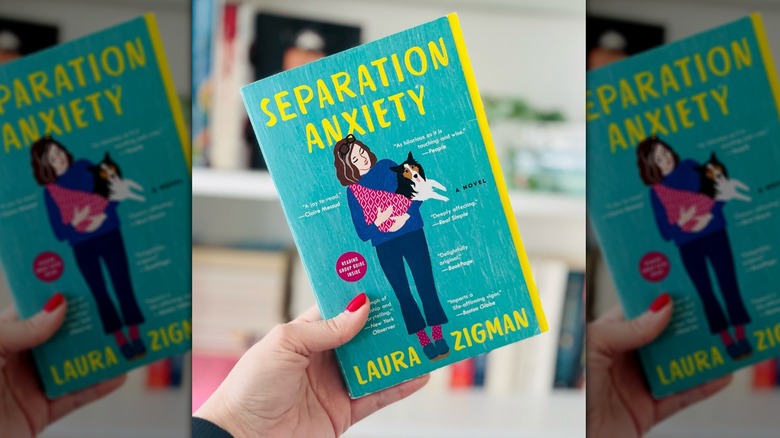The Best Book Club Picks For Women In Their 40s & Beyond
As we get older, the two most important things we can do for our health are to keep our minds active and our social calendars full. The easiest way to do that is by joining a book club. Not only do you reap the benefits that come with reading, such as stress reduction and improved memory, but when you gather with your fellow book club members, it can also reduce the risk of depression, heart-related ailments, and even premature death, according to the Mayo Clinic. In other words, book clubs may be the key to a long, happy life.
If you're in a book club and over the age of 40, there's a good chance you're looking for books that are more relatable for your age group, meaning nearing mid-life or smack dab in the middle of mid-life. While there's nothing wrong with reading books that are geared toward a younger audience, when you reach a point where you have so much life experience under your belt, you tend to want to read stories that have characters that are literally on the same page as you.
Although picking a new book for your book club might seem easy, mistakes can be made. That's why it's essential to expand your horizons when choosing your books by trying out different genres and exploring stories written by people who are the complete opposite of you. If you're ready to impress your book club with perfect picks for women 40 and older, then these six reads are a great place to start.
All Fours by Miranda July
If you've never heard of Miranda July, it's time. Not only is July an author, filmmaker, performance artist, muse, and a vocal feminist, but she also wrote "the first great perimenopausal novel," according to The New York Times. July's novel, "All Fours," is about a 45-year-old woman navigating life through perimenopause, an extramarital affair with a much younger man, and essentially blowing up her life in response to having a midlife crisis. It's a book that July felt needed to be written, based on conversations she'd had with friends her age.
"Upon turning 40, which was a few years before I started writing [the book], it seemed like this grim time was suddenly approaching that was very vague, like, this time of a woman who's no longer young," July told NPR in December 2024. "And I wanted to not write about that because so many women I admired, so many writers had written about more important things ... But the more that I got older ... and the more that I talked to other women and gynecologists and naturopaths, the more I felt that this subject actually wasn't separate from those more important things."
Only a handful of celebs have fought back against menopause misconceptions, and now July is one of them. While the book isn't strictly about perimenopause, it tackles all that comes with finding yourself in the middle of your life, a life that you just upended. July's writing delivers a chaotic ride that's sexy, witty, and, frankly, groundbreaking.
Girl in a Band by Kim Gordon
From 1981 to 2011, Kim Gordon was the bassist for the legendary rock band Sonic Youth. That was until her husband of 27 years and fellow band member, Thurston Moore, cheated on her with a much younger woman. Not only did Moore's infidelity put him in the category of celebs who admitted to cheating on their partners, ultimately leading to their divorce, but it also resulted in the breakup of one of the best bands of the 1980s and 1990s. "We seemed to have a normal relationship inside of a crazy world," Gordon told Elle in April 2013 about her marriage. "And in fact, it ended in a kind of normal way — midlife crisis, starstruck woman ... Thurston was carrying on this whole double life with her. He was really like a lost soul."
So Gordon pulled a Carrie Fisher and took her broken heart and made it into art with "Girl in a Band: A Memoir." While the memoir does talk about her marriage and the eventual cheating and end of her relationship with Moore, more than anything it's an intimate look into her life and what happened along the way to make Kim Gordon the rockstar we know today, as well as what it was like to be a woman in male dominated field, and the highs and lows that came with it. It also name-drops other famous musicians of that era, as well as iconic New York City establishments, some of which are long gone.
I Feel Bad About My Neck: And Other Thoughts on Being a Woman by Nora Ephron
Synonymous as Nora Ephron's name is with rom-coms — this is the genius behind "When Harry Met Sally," after all — that's just the tip of the iceberg. Ephron lived an extraordinary life, including fighting against sexual discrimination at her former workplace, Newsweek, and beautifully dragging her cheating husband, journalist Carl Bernstein, in her semi-autobiographical novel, "Heartburn," but she's also a master essayist. Nowhere is that more evident than in 2006's "I Feel Bad About My Neck: And Other Thoughts on Being a Woman."
Each essay nails what it's like to be a woman of a certain age, handling all the beautifully unnerving complexities that come with getting older in a humorous, honest way. "According to my dermatologist, the neck starts to go at forty-three, and that's that," Ephron writes. "You can put makeup on your face and concealer under your eyes and dye on your hair, you can shoot collagen and Botox and Restylane into your wrinkles and creases, but short of surgery, there's not a damn thing you can do about a neck. The neck is a dead giveaway. Our faces are lies and our necks are the truth. You have to cut open a redwood tree to see how old it is, but you wouldn't have to if it had a neck."
Have you ever read anything more accurate about a woman's inner dialogue? Sadly, Ephron passed away in 2012 after a six-year battle with myelodysplasia. But at least she left behind stories and movies that will be loved for generations.
Difficult Women by Roxane Gay
When it comes to book club choices for women over 40, you can't go wrong with anything by Roxane Gay. While it was The New York Times' best-selling 2014 essay collection "Bad Feminist" that made Gay a household name, her 2014 novel, "An Untamed State," and the 2017 memoir, "Hunger," are also great. That being said, the 2017 short story collection, "Difficult Women," is a fantastic place to start, because what woman hasn't been called difficult?
"I think women are oftentimes termed 'difficult' when we want too much, when we ask for too much, when we think too highly of ourselves, or have any kind of standards," Gay told Vogue in January 2017. "I wanted to play with this idea that women are difficult, when in reality it's generally the people around them who are the difficult ones."
Each story introduces another type of difficult woman, and what about her makes her that way through the lens of our culture — after all, it's pretty darn easy to be labeled difficult. While the imagery and tone that Gay creates are dark, that's simply because it exposes just how violent it is to be a woman in the world. In fact, despite her success with "Bad Feminist" in 2014, "Difficult Women" didn't exactly have publishers and editors jumping at the chance to bring it to publication because of how dark it is. As she also told Vogue, men write dark stories all the time, but if a woman does it, people are confused as to why. Every woman who reads "Difficult Women" will find herself in these characters.
Untamed by Glennon Doyle
Just like every writer on this list, Glennon Doyle needs to be on your radar if you're over 40. Published in 2020, "Untamed" is Doyle's third memoir, and it doesn't hold back, diving into topics like motherhood, family, religion, divorce, as well as Doyle's complicated upbringing. Its title, "Untamed", references the taming that the patriarchy imposes onto women and how, if we are to live our best lives — not just for ourselves, but for those around us, our children especially — we need to unlearn what we were taught and become untamed. It's the only way to truly empower ourselves.
"One of the most subversive, freeing questions a woman can ask herself is, 'What do I want?' And it feels simple, but it's not because we have been conditioned through religion, family, institutions, through all of it, to not trust what we want," Doyle told W Magazine in December 2020 when asked the first question women should ask themselves in their journey toward being untamed. "Men don't think that way ... Patriarchal thinking keeps us in our place and makes us feeling ashamed of our desire. It's all desire-based — whether that's desire for money, food, better sex, power. All of those things we're supposed to be ashamed of, so that we stay small in every region of our life and don't rock the boat." However, Doyle encourages women to rock that boat and essentially live out loud fearlessly. You'll walk away from this book feeling like you can conquer the world and with a new understanding of how the patriarchy negatively affects everyone, regardless of gender.
Separation Anxiety by Laura Zigman
Because we needed a laugh-out-loud novel for this list, "Separation Anxiety," by Laura Zigman, fits the bill perfectly. The story is about Judy, a 50-year-old woman in the throes of middle age. She has a teenage son who's being a teenager, a career that's not going anywhere, a best friend who's terminally ill, and a husband she can't afford to divorce. With all this happening, she decides one day to start wearing the family dog, Charlotte, in a sling to feel an emotional connection while everything around her gets more complicated.
Judy is the right amount of neurotic and absurd to make her both lovable and relatable as she navigates her early 50s with Charlotte strapped to her body. "I knew I wanted to write about a woman set in the time of life when loss seems overwhelming; when the sense of possibility you feel when you're young and when your family is young is lost and has been replaced by melancholy," Zigman told NPR in March 2020. "People you love are gone; dreams you had for yourself haven't been realized; most things haven't turned out the way you thought they would. Loss and grief for big and small things can wear you down and wear you out, and that's where this novel starts: In that still point of sadness."
While there are some dark themes, Zigman writes with wit and humor. As Nora Ephron said, "My mother wanted us to understand that the tragedies of your life one day have the potential to be comic stories the next." That's exactly what Zigman does in her novel.

